
Slinking through the undergrowth, keeping an eye on my ammo count and the hills in the distance, I can feel the anxiety in the pit of my stomach. Moments ago, I was hunting another Hunt: Showdown player. A stray bullet cracked the silence, sending me diving into the nearest foliage, unsure whether I was being targeted, or if I had simply stumbled on the periphery of a different fight. Suddenly, everything is a threat. Every sound, every open door, every stray piece of loot. Is someone watching me as I crawl to safety, waiting to gut me?
This is a regular occurrence in battle royales for me, whether I'm solo or in a team. Even when they're not filled with monsters and supernatural scares, they scratch my itch for fear in a way that even the best horror games frequently fail.
The tension that surrounds every encounter in these games is palpable. Relying on audio cues and signs of player activity puts my senses into overdrive every time I play. Committing maps to memory means that an open door in an area you know there shouldn't be an open door becomes a sign that someone has been there—recently or not. Are they still there; am I a fly in a web?
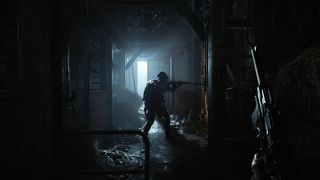
Glowing pools of Fortnite loot, the whirr of gunship strafing runs in Warzone, dogs barking in Hunt: Showdown—these are all signs that someone's life has probably ended, and that more could follow. Although it's possible to win without firing a shot, most battle royale contenders are out for blood. Scant loot and limited victory conditions mean that it is kill or be killed, and no AI can stalk you as well as a real player.
No amount of computer game trickery is as terrifying as knowing that moments ago someone had a bead on you with a lever-action rifle. In Showdown, the impeccable sound design is a large part of why this works. Silences are vast and daunting, with bouts of gunfire echoing across the map as you creep towards the inevitable boss encounter. Working out where this gunfire came from is part of the fun, but it also means you're about to get into a fight, and there's a good chance you won't make it out alive.
The lethal, terminal nature of encounters also reinforces this dread. Life ends so quickly in Hunt that even a single mistake can leave your group isolated from each other with no easy revival strategy. A skilled team can pick you off one by one before you've even had time to identify where they're coming from—a shadow from the bayou undergrowth snuffing you out with ease.
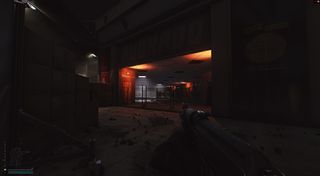
Moments like this aren't limited to the weird gothic west of Showdown though. Even fully geared up in the military cosplay of Warzone, players still have the ability to cause me to sweat and jump out of my chair. I'm generally pretty robust when it comes to horror games, partly because I know it's all fictitious—the monsters are on guide ropes, they're dancing to the tune of the programmer. Warzone's human combatants aren't nearly as predictable.
PC Gamer Newsletter
Sign up to get the best content of the week, and great gaming deals, as picked by the editors.
In Warzone, the threat of a closing team gets right under my skin. Every urban passageway, every doorway, every undulation in the scenery has the potential to mask assailants, but it's the sheer determination of players to take out my teammates and I that makes it so terrifying. Essentially, battle royales at their best share a lot of their verbs with horror games. Stalking, hunting, sneaking, hiding. Every encounter has the chance to be so lethal that it's natural to adopt a sense of caution. The long stretches of calm between each encounter, and the eerie calm that descends as you move between points of interest is a more natural form of the constructed pacing that horror games use to build tension.
Alien Isolation might feature some of the best AI in horror games to date, with its scuttling, predatory Xenomorph and determined, methodical Working Joes, but battle royales like Warzone and Hunt are frequently more effective because human players are able to shift naturally between both these two modes—the outright aggression of a close-range player bursting through a door, or the slow plink of bullets from a distance.
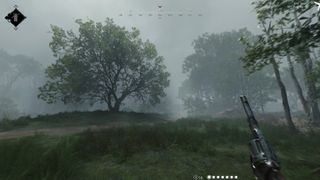
Squads of players are also able to work together in ways that AI frequently struggles: it's not unusual for players to use downed comrades as bait, turning a vulnerability into an advantage. In Hunt: Showdown, players have a bevy of tools they can use to play mind games: throwing decoys to psych you out, alerting the wildlife in order to misdirect, closing off escape routes with barbed wire traps. Whereas singleplayer horror games will frequently change things artificially in order to scare you: teleporting the Xenomorph around or causing interactive objects to fail on purpose to heighten tension.
Whilst I am sure other players are having the same scrappy experience as me, in the moment it feels like every assailant is as methodical as a killer android or xenomorph. Managing to hide in a corner, having an enemy team scurry past and somehow miss me, it always has me leaning forward at my desk, ready to desperately fight back. Dying means starting from nothing, slowly turning the screw again as early moments of loot hunting see you grab your favoured gear, amping up the potential for loss again.
Nothing conveys the sense of loss better than another battle royale adjacent game: Escape From Tarkov. Like Hunt, its raids are filled with NPCs and players, divided up into Scavs and PMCs. If you go in as a PMC, everyone is hostile to you. As you pick through dilapidated buildings to find loot that is added to your permanent inventory, you have to be aware of the crunching of gravel and the whizz of bullets—anyone in the zone will kill you for that chocolate bar you just picked up. If you die, that's it. Your gear is gone. You can insure it, but if they steal your stuff, that contract is void.
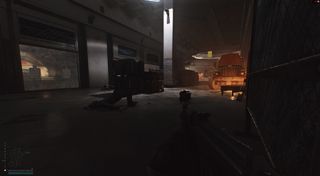
The long term impact of death in Tarkov raises the stakes. Your inventory is permanent outside each match. You have a lair, and you build gear and equipment in real time. Weapons that are taken into a raid are lost on death, along with any other belongings. The better gear is, the more risky it is to take into a raid, so finding a good gun or a rare piece of loot in a raid ratchets the tension up further, as it means nothing unless you can extract safely.
Scav runs are a way of insulating yourself from this: jump into a raid as a Scav and you'll get a random loadout, and AI Scavs will be friendly. So playing as a Scav keeps you safe from NPCs, but to players you're easy fodder. Flip the tables, and as a player you realise that any Scav has the potential to be a trained killer. Sure, the AI acts and moves in a certain way, but players are smart and will use that to their advantage. In a cunning move, Battlestate Games has made it so Scavs wiggle in order to mimic players. Using the lean left and right keys, players would wiggle to their teammates in order to make them aware that they weren't a random NPC Scav. This makes it even harder to distinguish who is human and who is an AI. Because Scavs frequently deliver canned vocal barks, players have also taken to hitting the shout button at random times to mimic them.
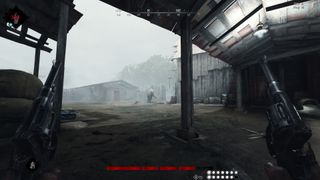
This means you'll have to get used to the paranoia. As a Scav, the AI won't target you automatically, but don't get too comfortable. I've been sat in the looted shops of Interchange, thinking I'm safe next to a hollering Scav who is patrolling back and forth, only to end up taking a bullet to the back from a player masquerading as a dumb NPC. There's a lot of room for mind games.
There are definitely people out there able to play battle royales cool as a cucumber, but they've been terrifying me since the first time I scanned a hillside in Fortnite and spotted a player constructing a small tower. Battle royales are able convey the feeling of being watched, and of being stalked, of being the prey in someone else's hunt. It's a testament to the strength of the genre that it's able to convey this feeling in something as technicolor as Fortnite. I dread the day that developers figure out how to inject this same sense of dread into regular horror games, but I'm also a little excited.
Most Popular



